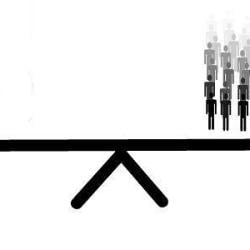
In the past year, a number of interesting articles have been published about honor and shame in the Bible. Te-Li Lau looks at Paul’s language in 1 Corinthians in an article titled “I write these things not to shame you” (JETS 60, no. 1 (2017): 105–24).
Paul’s Contrary Uses of Shame
Lau focuses on 1 Cor 4:14. To remind you of the context, 1 Cor 4:13–15 says
…when slandered, we entreat. We have become, and are still, like the scum of the world, the refuse of all things. I do not write these things to make you ashamed, but to admonish you as my beloved children. For though you have countless guides in Christ, you do not have many fathers. For I became your father in Christ Jesus through the gospel.
Given Paul’s sarcasm in the prior paragraph, one would think he intends to shame them. By contrast, Paul elsewhere says directly that he wants to shame them (1 Cor 6:5; 15:34). The article attempts to make sense of this shaming-language in 1 Corinthians.
Lau’s conclusion appears counterintuitive. Despite Paul’s explicit statement, Lau says Paul actually intends to shame the Corinthians in 4:14. According to Lau,
Paul differentiates between two uses of shame: a rhetoric of shame that tears down and a rhetoric that build up. Specifically, there is a rhetoric of shame that the wandering sophists employ and which Paul repudiates. Nevertheless, there is also a rhetoric of shame that a loving father might employ to instruct his children; this is the rhetoric that Paul employs.
Ultimately, shaming is a tool to transform their minds.
Does Lau contradict Paul?
Lau’s augment largely hangs on a potential distinction between ἐντροπή, used in 4:14, 6:5; 15:34, and the αισχρος-word group, which Paul more frequently uses for “shame.” He quotes Richard Trench, who claims ἐντροπή “conveys at least a hint of that change of conduct, that return of a man upon himself, which a wholesome shame brings with it in him who is its subject.”[1]
I agree that shame can be used positively and negatively, yet I do wonder if Lau makes too much of Trench’s conjecture. Suppose ἐντροπή refers to an edifying use of shame, whereas αισχρος connotes a destructive humiliation. This distinction does not explain Paul’s contrary uses of ἐντροπή. Compare each verse below.
“I do not write these things to make you ashamed, but to admonish you as my beloved children.” (4:14)
“So if you have such cases, why do you lay them before those who have no standing in the church? I say this to your shame.” (6:5)
“Wake up from your drunken stupor, as is right, and do not go on sinning. For some have no knowledge of God. I say this to your shame.” (15:34)
In each case, Paul seeks a change in their behavior or perspective. Lau suggests that the “οὐ… ἀλλά” construction in 4:14 reads something like “I do not write these things merely to make you ashamed, but …” (cf. 1 Cor 1:17). Shaming and admonishing are not opposites. Thus, Paul does write to shame them (but for a good purpose).

If Lau is correct, a problem remains: 1 Cor 4:14 seems redundant since ἐντροπή would already connote an admonition. Whereas “baptize” and “preach” are distinct in 1:17 (which uses “οὐ… ἀλλά”), the distinction seems to collapse in 4:14.
How Shaming Challenges and Corrects
Might Paul have another intention? I propose the following for your consideration. I invite your feedback as I continue to reflect on Paul’s meaning.
In both 1 Cor 6:5, 15:34, Paul uses shame to rebuke wrong behavior. He wants readers to see the incongruity of their actions with their identity. This is not the explicit intention of 4:14. Paul in 1 Cor 4:16 says, “I urge you, then, be imitators of me.” From the previous context, he exhorts the Corinthians to be faithful to the ways of Christ (cf. 4:1–2, 17).
What then can we conclude? Paul uses shame to stop shameful behavior. But he does not use shame to motivate positive behavior.
By contrast, people often use shaming as a tactic to pressure people to do something. Yet, if people do something merely to avoid shame, they don’t act out of their identity. Paul wants the Corinthians to have the mind of Christ. This means they their sense of identity will positively shape their lives, i.e. doing and thinking this or that way. On the other hand, when we do wrong, we need reminding that our actions do not accord with calling or belonging.
I agree with Lau that Paul’s two uses of shame have a positive and negative sense. However, it seems Paul is simply coming at the goal (of edification) from two directions. In 4:14, he wants to spur a way of life. In 6:5, 15:34, Paul wants to stop a pattern of life. The former is constructive; the latter is corrective.
If this reading is right, these observations are quite applicable to our lives.
What do you think?
[1] Cited from Richard Trench, Synonyms of the New Testament (London; Macmillan, 1880), 69.

















